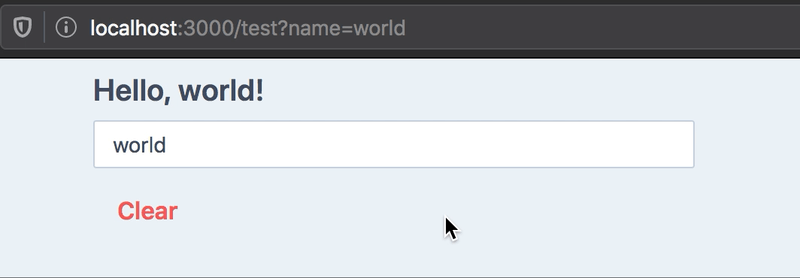useQueryState hook for Next.js - Like React.useState, but stored in the URL query string
- 🧘♀️ Simple: the URL is the source of truth.
- 🕰 Replace history or append to use the Back button to navigate state updates
$ yarn add next-usequerystate
or
$ npm install next-usequerystateimport { useQueryState } from 'next-usequerystate'
export default () => {
const [name, setName] = useQueryState('name')
return (
<>
<h1>Hello, {name || 'anonymous visitor'}!</h1>
<input value={name || ''} onChange={e => setName(e.target.value)} />
<button onClick={() => setName(null)}>Clear</button>
</>
)
}useQueryState takes one required argument: the key to use in the query string.
Like React.useState, it returns an array with the value present in the query
string as a string (or null if none was found), and a state updater function.
Example outputs for our hello world example:
| URL | name value | Notes |
|---|---|---|
/ |
null |
No name key in URL |
/?name= |
'' |
Empty string |
/?name=foo |
'foo' |
|
/?name=2 |
'2' |
Always returns a string by default, see Parsing below |
If your state type is not a string, you must pass a parsing function in the second argument object.
You may pass a serialize function for the opposite direction, by default
toString() is used.
Example: simple counter stored in the URL:
import { useQueryState } from 'next-usequerystate'
export default () => {
const [count, setCount] = useQueryState('count', {
// TypeScript will automatically infer it's a number
// based on what `parse` returns.
parse: parseInt
})
return (
<>
<pre>count: {count}</pre>
<button onClick={() => setCount(0)}>Reset</button>
<button onClick={() => setCount(c => c || 0 + 1)}>+</button>
<button onClick={() => setCount(c => c || 0 - 1)}>-</button>
<button onClick={() => setCount(null)}>Clear</button>
</>
)
}By default, state updates are done by replacing the current history entry with the updated query when state changes.
You can see this as a sort of git squash, where all state-changing
operations are merged into a single history value.
You can also opt-in to push a new history item for each state change, per key, which will let you use the Back button to navigate state updates:
// Default: replace current history with new state
useQueryState('foo', { history: 'replace' })
// Append state changes to history:
useQueryState('foo', { history: 'push' })Any other value for the history option will fallback to the default.
Because the Next.js router is not available in an SSR context, this
hook will always return null on SSR/SSG.
MIT - Made with ❤️ by François Best - Donations welcome 🙏


